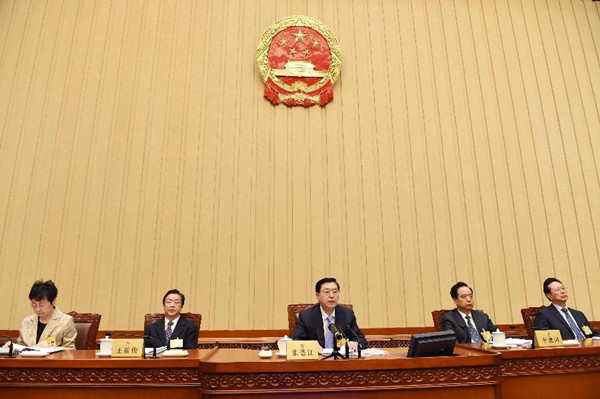
Zhang Dejiang (3rd L), chairman of the Standing Committee of China's National People's Congress (NPC), presides over the 14th meeting of the 12th NPC Standing Committee, in Beijing, China, April 24, 2015. China's top legislature ended its bimonthly session on Friday, with revised laws on food safety and advertising, and giving the go-ahead to changes to the jury system. (Photo: Xinhua/Rao Aimin)
China's top legislature ended its bimonthly session on Friday, with revised laws on food safety and advertising, and giving the go-ahead to changes to the jury system.
The amendment to the Food Safety Law increases penalties to offenders and adds new provisions on baby formula and online shopping.
Zhang Dejiang, chairman of the Standing Committee of the National People's Congress, said that the law, with an emphasis on prevention and risk control, becomes easier to implement.
The revised Advertising Law restricts tobacco advertising, banning all forms of advertising targeting minors.
To promote breastfeeding, the amendment also banned advertising of baby formula, forbidding claims that dairy products, drinks and other foods can substitute for breast milk.
Zhang said the revised law will help the advertising industry while protecting consumers' rights and interests.
The top legislature approved a bill to pilot reforms to the jury system in 10 provincial-level regions. The minimum age for jurors will be raised from 23 to 28 and the educational requirement will be lowered from junior college to senior high school.
A draft national security law and a bill to regulate overseas NGOs were submitted for a second reading during the session. Submitted for their first reading were amendments to the Securities Law and to the Seed Law.
Amendments to streamline administration and delegate powers to lower levels were approved for 25 laws, including drug administration, education, the postal service, railways, tax, the tobacco monopoly and pollution.
A protocol to the Treaty on Nuclear-Weapon-Free Zones (NWFZ) in Central Asia was ratified.
At a symposium on information technology and security on Friday afternoon, Huai Jinpeng, a member of the Chinese Academy of Sciences, delivered a report calling for advances in the technology, law, human resources and management needed to upgrade the information industry and guarantee information security.
Huai proposed moving China's electronic and information industry up the global value chain by developing a cohort of multinationals with indigenous brands.
















































